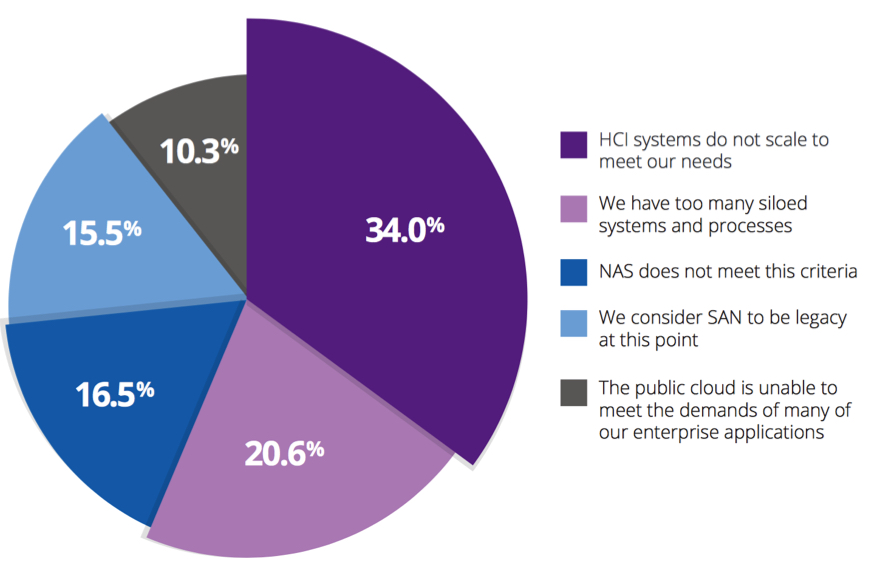86% of Companies Plan to Increase IT Transformation Investment Over Next 5 Years – Datrium
56% of respondents already have HCI, while additional 18% currently evaluating the technology.
This is a Press Release edited by StorageNewsletter.com on May 24, 2019 at 2:52 pmDatrium, Inc. announced the findings of its industry report on the State of IT Transformation, which dives into the critical data centre challenges confronting IT organisations, the barriers preventing them from reaching their IT transformation goals and the steps they are taking to overhaul their IT infrastructure to better meet the complex demands of modern applications.
The findings laid out in the report were based on the results of a survey of more than 540 IT professionals.
The research results suggest that although the vast majority of IT organisations have implemented a variety of systems and tools to modernise, simplify and streamline data centre operations, many are still burdened by inefficiencies, security risks and performance gaps in their IT infrastructure as well as the excessive time it takes to manage legacy infrastructure.
“In today’s always-on business climate, digital transformation is key to creating competitive advantage. However, to achieve complete digital transformation, IT must be transformed as well. Unfortunately, for many organisations, the time, energy and resources that should be dedicated to the execution of strategic digital transformation initiatives are instead being wasted on running antiquated legacy infrastructure that’s overly complex and time-intensive to manage,” said Tim Page, CEO, Datrium. “It’s no wonder that 70% of businesses today are in favour of primary and backup storage on a single platform that doesn’t require paying extra for backup.”
Liberated by Automation, IT Would Transform Faster
to Support the Always-on Business
With the growth of data that organisations are producing, storing and analysing, IT organisations are becoming increasingly overburdened by the need to manage infrastructure that is ill-equipped for the ever-more complex data centre.
More than 87% of respondents stated they would spend more time on strategic initiatives if they were able to simplify and automate routine tasks. However, inadequate infrastructure frequently keeps this goal out of reach.
- As 41% of respondents identified, the time required to manage legacy infrastructure is one of the most significant barriers preventing their companies from reaching their IT transformation goals.
- For many respondents, the most critical challenge caused by the growth in the volume, variety and velocity of data is the excessive amount of time spent managing infrastructure.
- In fact, after cost savings, time savings was identified as the second most common consideration IT organisations take into account when assessing if their infrastructure is meeting expectations.
More Than Half of IT Pros Cite Performance Deficiency
Due to Volume, Variety and Velocity of Data
Among the various challenges caused by the exponential growth of data, application performance deficiencies were the biggest concern for organisations, with more than 50% of respondents identifying this as an issue.
- 40% of IT professionals surveyed believe their data centre infrastructure is either not adequately equipped, or only somewhat equipped, to manage all of their organisation’s demanding workloads.
- Nearly one-third (28%) of IT professionals find it challenging to provide adequate data security in the face of exponential data growth
- The top concern among those claiming their infrastructure cannot properly manage their demanding workloads is that the hyperconverged systems do not scale to meet their needs.
Despite Budget Constraints, Majority Plan to Increase Spend on IT Transformation
Cost is a major consideration for organisations when implementing IT transformation initiatives. According to survey results, cost savings was selected by 52% of respondents as the primary measurement of whether IT infrastructure is meeting the goals that have been set for it.
When asked about barriers to achieving their IT transformation objectives, nearly half of survey respondents (49%) named budget constraints as a reason.
- Although transforming IT can be a costly upfront endeavour, many organisations also view it as an investment that will help provide longer-term cost savings.
- At 86%, the vast majority of respondents anticipate that their company will increase its investment in IT transformation over the next five years.
Asked whether they would find value in having their primary and backup storage on a single platform that doesn’t require paying extra for backup – thereby reducing IT spend – 70% of respondents agree that it would be valuable.
Modern Data Centre Becoming Increasingly Multicloud
The survey showed that the most common steps companies have taken to modernise and transform IT are related to the implementation of cloud in the data centre. The top three steps respondents identified were the use of private cloud infrastructure (43%), public cloud infrastructure (42%) and hybrid cloud (35%). In fact, many organisations are using multiple public cloud providers to manage their data and transform IT.
- 42% of respondents operate a multicloud data centre, with 32% using a combination of on-premises infrastructure and multiple public clouds, while 10% are only using multiple public clouds.
- After cloud initiatives, the IT transformation technologies that respondents reported having already implemented most were: virtualisation, data management automation and hyperconverged infrastructure.
- Regarding the use of hyperconverged infrastructure (HCI), 56% of respondents noted that their organisations already have HCI deployed in their data centres, while an additional 18% are currently evaluating the technology.
- However, 34% of IT respondents say the HCI systems they are aware of don’t scale to meet their needs

“We’ve heard similar challenges and intentions from our customers as they’ve been working to transform their IT,” Page said. “To liberate IT from complexity, modern infrastructure must provide all five core services-primary storage, backup, DR, encryption and mobility-on a single data plane. This is why we created a fundamentally new approach that provides all five key functions from a unified management platform, out of the gate.”













 Subscribe to our free daily newsletter
Subscribe to our free daily newsletter

